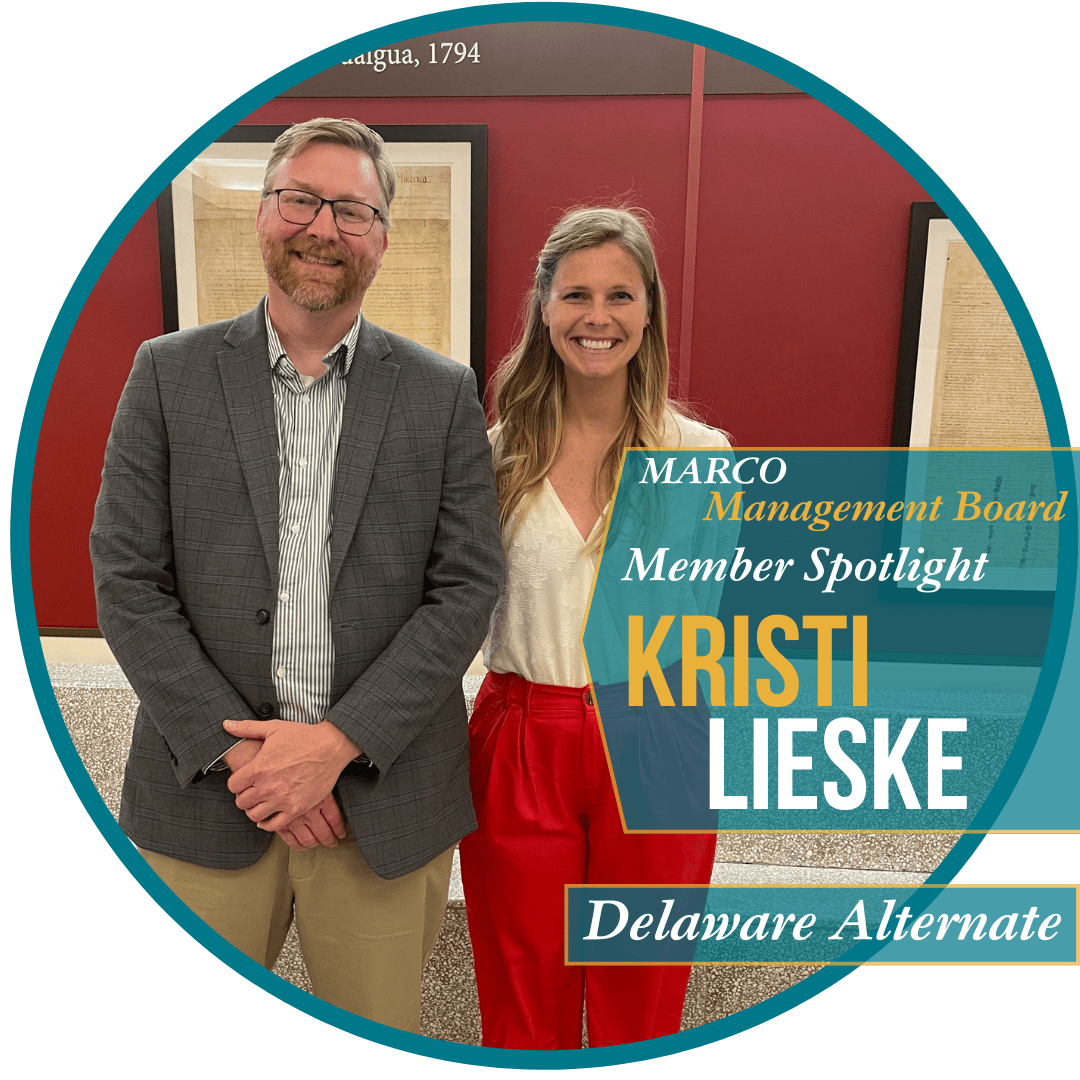MARCO Management Board Member Spotlight – Kristi Lieske, Delaware Alternate
As part of an effort to help MARCO stakeholders and partners get to know members of the MARCO Management Board, the quarterly newsletter has added a new feature – “Spotlight on a Management Board Member.” This month’s spotlight is on the alternative representative from Delaware, Kristi Lieske. Kristi Lieske is also the new MACO Chair as of July 1, 2023!
What is your name?
Kristi Lieske
What is your work title?
Ocean Planner

What organization do you work for?
Delaware Department of Natural Resources and Environmental Control, Coastal Programs
How many years have you served on the MARCO Management Board?
I have served as the alternate to Management Board member and former Chair, Kim Cole, for two years.
What is your role on the Management Board?
I am the alternate Delaware Management Board member.
What MARCO workgroups do you participate in?
I participate in the Marine Debris Work Group, Offshore Wind Regional Collaboration Work Group, and recently joined the Non-Consumptive Recreation Work Group.
What are your daily job duties?
So many different things! The ocean is a vast resource, providing countless opportunities for us land-dwellers. So I get to spend my days learning about and addressing a diverse set of topics, including marine wildlife, recreation and tourism, and offshore energy, both at the state level and on a regional scale through MARCO. Right now I am leading the effort to develop an Ocean and Bay Plan for Delaware so I am engaging with subject matter experts, as well as the public, on a regular basis.
What are the most fun and the most challenging parts of your job?
The most fun part of my job is connecting with others that have the same passion as I do for preserving the ocean and all it provides for us. It doesn’t matter if it’s an expert in the field or someone who just loves a particular topic, when we can talk about something and their eyes light up as they speak, it’s always a fun and motivating part of my job.
Ensuring all perspectives are heard and feel they’ve been heard and incorporated can be challenging in this position. There can sometimes be competing interests as we demand more from the ocean and it can be tricky to balance those needs. However, we’ve found major benefits to early coordination and engagement with a diverse set of stakeholders to help ensure decisions are inclusive and fair.
Why did you get involved in ocean resource management?
I’ve had a passion for marine life ever since I was a kid and bought my first book called “Baby Whale” by Lynn Wilson from our school’s Scholastic Book Fair. Through college courses at University of Delaware, recognizing the importance of collaborative approaches to find solutions to challenges, my passion evolved into marine resource management. Delaware Coastal Programs offered a way to direct this passion to effect change so that my kid and future generations can enjoy the same things I did.
What is the most pressing ocean resource issue in your state?
Tackling the challenge of protecting Delaware’s marine resources, ecological functions, and ocean uses as there is escalating demand for water space off our coast. Balancing the needs of Delawareans with the conservation of marine resources requires coordination across state borders so we are very grateful for the opportunity to elevate Delaware’s priorities, along with other states, at a regional level.
What is your hope for the future of ocean resource management?
I hope that through relationship building, we can create platforms for dialogue, share information on resource management best practices, and foster collaboration to ensure that decisions are inclusive and informed by diverse perspectives.
MACO Chair Questions
As the newly appointed Chair of MACO, what is your vision for the committee’s role in addressing the pressing environmental challenges facing our oceans?
MACO is special because it’s built up these robust relationships between federal, state, and fishery management agencies, as well as tribal partners. Leveraging the resources of all these partners and engaging in meaningful actions has enabled us to address some of the region’s priority challenges over the years. I’m really looking forward to continuing the momentum that has been built, especially coming off this year’s in-person Forum, to strengthen old relationships and establish new ones. Strong partnerships will help us launch new initiatives to not only address environmental challenges but ensure equity and inclusivity in our planning efforts.
The Mid Atlantic region has a diverse range of stakeholders, from environmentalists to industry representatives. How do you plan to balance their competing interests and ensure effective collaboration?
There’s no easy solution but I think with a holistic, collaborative approach to planning, it is possible to reconcile these sometimes competing interests. Encourage open dialogue, collaboration, and the inclusion of diverse perspectives to find common ground and mutually beneficial solutions. This comes easier when you have strong relationships to build on. Stakeholders need to be asked for their long-term perspective feedback. Considering emerging and potential future uses of ocean space, as well as the cumulative impacts of multiple activities over time and space.
What part of your role as MACO Chair do you feel will be most challenging and the most rewarding?
I think the most challenging part of being MACO Chair will be ensuring that all members and stakeholders see their value in participating and providing input. The stakeholders we engage with have unique perspectives that are incredibly valuable and I want to ensure they know how much we rely on their input to inform our work. Along with this being the most challenging part, I think it will also be the most rewarding, to create an atmosphere that everyone finds value in and recognizes their voice is needed.
Share this:






